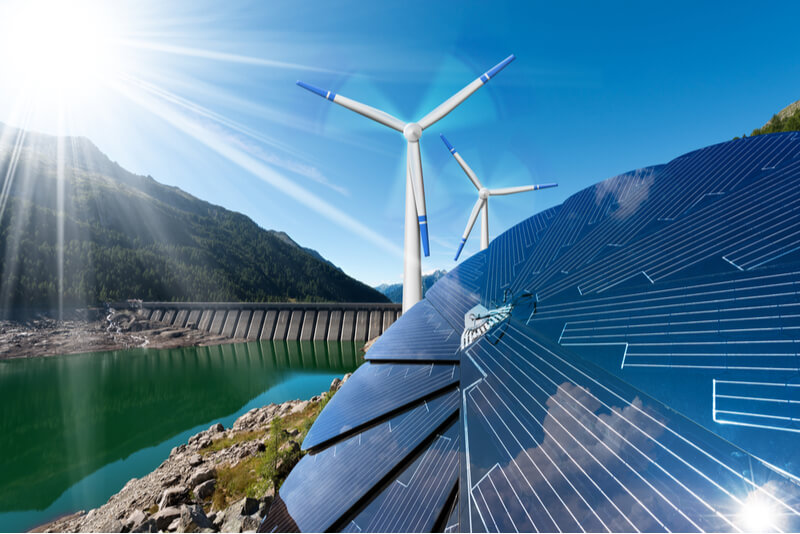
[Alberto Masnovo/Shutterstock]
[Alberto Masnovo/Shutterstock]
Green energy refers to electricity generated from sources that do not add significantly to the planet’s carbon footprint. The idea is that the growing use of green electricity will forestall global warming. Suppliers in deregulated states across the U.S. offer green products, some with energy generated by 100 percent green methods and others with varying percentages of green generation.
Green energy and renewable energy are often used interchangeably, but there is a small difference. All green energy is renewable, while some renewable products aren’t always green. Biomass can fall into this category, but there is ongoing scientific debate over it.
The Energy Information Administration considers the following generation methods and sources renewable: hydroelectric, wind, geothermal, biomass, wood and wood-derived, other biomass, and solar. Generation from those sources increased 28.6 percent from 2015 through 2020. Together, those generation methods made up more than 22 percent of the country’s electricity.
Following is the amount of green energy produced in prominent deregulated states and the largest contributor to that total, according to EIA data for December 2020:

[Fauod A. Saad/Shutterstock]
Texas leads in electricity generated by wind, California tops solar, and Washington state leads in hydroelectric power.
Every deregulated electricity plan in Texas includes renewable energy. You can find the percentage in a plan’s Electricity Facts Label. Our buying guide can help with sorting through plans for great value. Most providers also sell plans fueled by additional green energy, as much as 100 percent.
The following providers only sell green plans:
| Plan Name | Plan Length | Rate |
|---|---|---|
| Gexa Energy - Gexa Eco Saver Plus 12 | 12 months | $0.107 / kWh |
| Gexa Energy - Gexa Eco Saver Plus 24 | 24 months | $0.107 / kWh |
| Gexa Energy - Gexa Saver Freedom 36 | 36 months | $0.171 / kWh |
| Gexa Energy - Gexa Saver Freedom 24 | 24 months | $0.176 / kWh |
| Gexa Energy - Gexa Straight Saver 12 | 12 months | $0.191 / kWh |
| Gexa Energy - Gexa Eco Saver Lite 12 | 12 months | $0.195 / kWh |
| Gexa Energy - Gexa Eco Saver Advantage 12 | 12 months | $0.197 / kWh |
| Gexa Energy - Gexa Eco Saver Premium 12 | 12 months | $0.212 / kWh |
| Gexa Energy - Gexa Eco Saver Premium 24 | 24 months | $0.212 / kWh |
| Gexa Energy - Gexa Solar Buyback Saver 12+ | 12 months | $0.243 / kWh |
Please note: All rates above are accurate as of 4/23/2024, 6:41:16 PM CDT for ZIP Code 75001. Rates may have changed since this date/time. For the most up to date rates in your area, please enter your zip code above.
| Plan Name | Plan Length | Rate |
|---|---|---|
| Green Mountain - Pollution Free e-Plus 24 Preferred | 24 months | $0.158 / kWh |
Please note: All rates above are accurate as of 4/23/2024, 6:41:16 PM CDT for ZIP Code 75001. Rates may have changed since this date/time. For the most up to date rates in your area, please enter your zip code above.
Green energy plans are sold outside Texas as well, and you don’t have to do a web search for “renewable energy plans near me” or “green electricity providers in my area” to find them. Simply enter your ZIP code and Choose Energy will return plans available to you. You can sort by green energy, price, term, and more to find what you need.
Other factors that may influence your decision include no-deposit plans or prepaid electricity.
Deregulation doesn’t just apply to residential customers, and neither does green energy. Both are available to business energy customers as well. More and more businesses are trying to reduce their carbon footprints, and green energy plans can accomplish or at least help with that.
Choose Energy offers business energy solutions tailored for your company. Our energy experts need a little information about your average usage and when you use the most energy. Give us a call at the number on this page or fill out this form for help.
No. Your provider will buy renewable energy credits to offset 100 percent of your energy use. Green energy delivered to the grid mingles with electricity from fossil and other fuels.
The credits are used to help pay for expansion of other green energy efforts, thereby raising the amount of renewable energy in the grid.
Some of it does. For example, solar panels use some toxic metals. Wind turbine blades, once they’re no longer useful, can sit for years in landfills. But the reduction in carbon dioxide remains a positive.
In every deregulated state, green and other types of energy are delivered to homes and businesses by utilities. These companies are in charge of maintaining and repairing the equipment used for transmission. If you experience an outage, contact your utility.
Ready to shop for green energy rates? Just enter your ZIP code in the space on this page. Filter the results for green energy and find a plan that’s right for you. Your new provider will help with setting up service so there’s no interruption.
You also can contact one of our energy experts at the phone number on this page.
Start now to reduce your carbon footprint with a renewable energy plan.
Reliant Energy is a Houston-based retail energy provider (REP) that has powered millions of homes and businesses across the Lone Star State. This provider is
TXU Energy is a Texas retail energy provider (REP) that has operated across the Lone Star State since 1984. Not only is TXU Energy one


